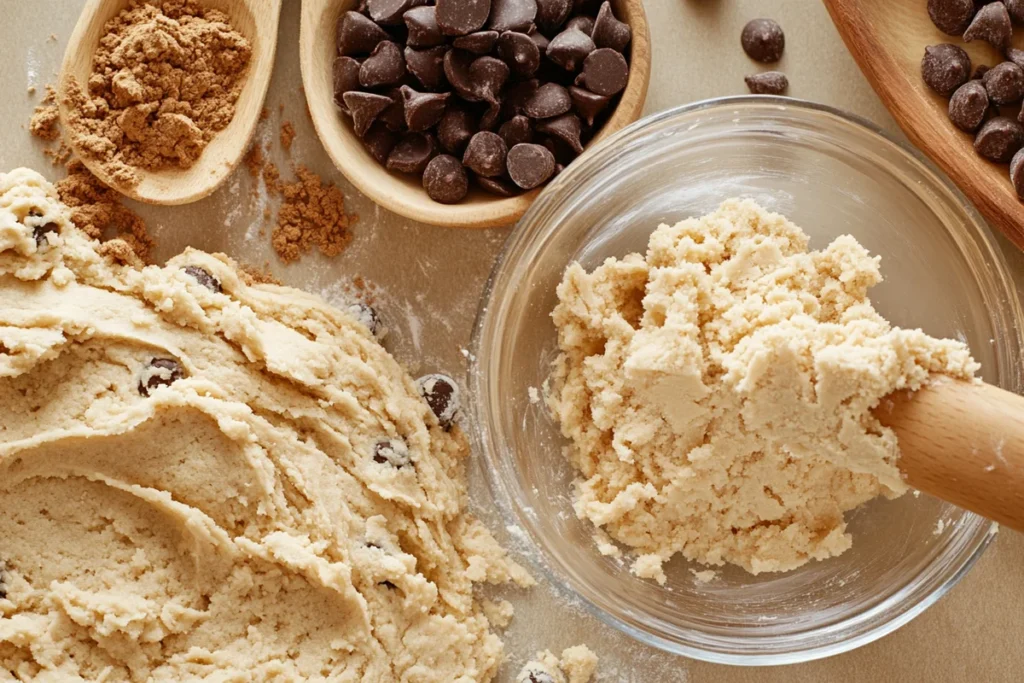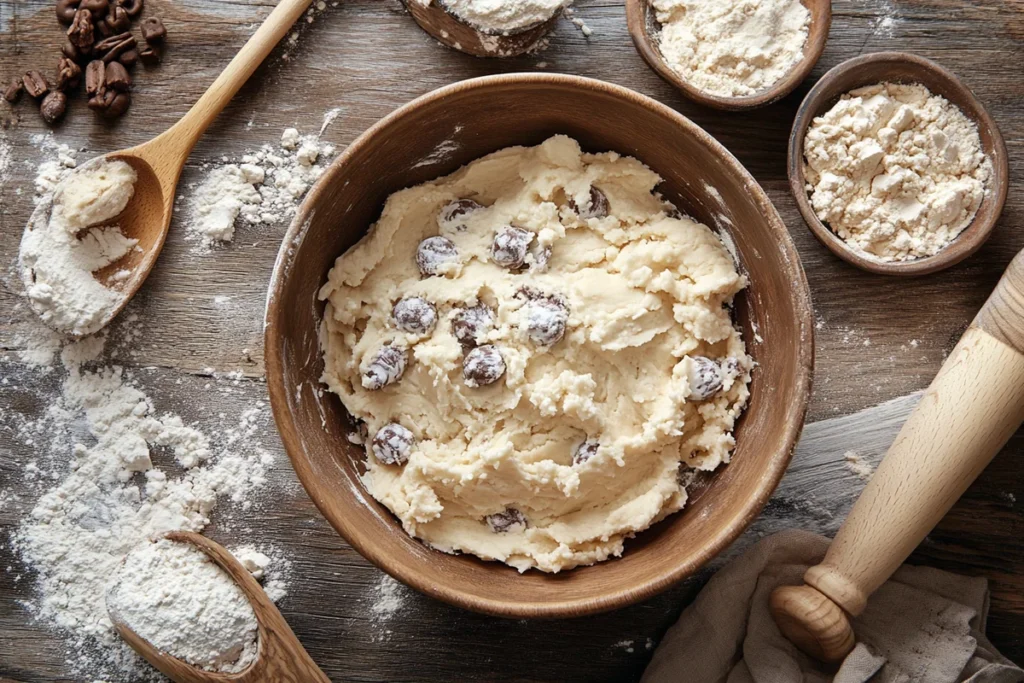In baking, cookie dough mix is a popular and convenient option. Whether you’re short on time or want a quick, easy solution for making cookies, cookie dough mix is your best friend in the kitchen. It combines the essential ingredients needed to create delicious, homemade cookies, often in just a few steps. But what exactly is cookie dough mix, and how can you best use it to suit your baking needs? In this comprehensive guide, we will explore everything you need to know about cookie dough mix, from its ingredients and types to how to make it from scratch and store it.
What Is Cookie Dough Mix?
Cookie dough mix is a pre-prepared blend of dry ingredients that simplifies cookie-making. Instead of measuring out individual components like flour, sugar, and baking powder, a cookie dough mixs combines all these essentials into one package, making cookie baking faster and easier.
This mix type is particularly popular with those who want to enjoy fresh cookies without spending much time measuring and mixing ingredients. Some cookie dough mixes even come with additional ingredients like chocolate chips, which means you only need to add wet ingredients like butter, eggs, or oil.
Benefits of Using Cookie Dough Mix
There are several benefits to using cookie dough mix, especially for busy bakers:
- Saves time: You don’t have to measure out each ingredient.
- Consistency: Since the ingredients are pre-measured, you’re less likely to make mistakes.
- Versatility: Cookie dough mixs can be used as a base for a wide range of different cookies.
- Shelf life: Many store-bought mixes have a long shelf life, allowing you to keep them on hand whenever the cookie craving strikes.
Key Ingredients in Cookie Dough Mix
At its core, a cookie dough mixs typically contains the following ingredients:
- Flour: This provides the structure for your cookies, making it the backbone of any dough.
- Sugar: Both white and brown sugars are often included, with brown sugar adding moisture and a rich, caramel-like flavor.
- Butter or oil powder: Many mixes come with a powdered fat source, but most require you to add fresh butter or oil.
- Baking powder or baking soda: These leavening agents help the cookies rise and achieve that light, chewy texture.
- Salt: Salt balances out the sweetness and enhances the other flavors in the cookie.
Different Types of Cookie Dough Mixes
You’ll likely have many options when shopping for a cookie dough mixs. Here are some of the most popular varieties:
- Chocolate Chip Cookie Dough Mix:
- The classic cookie dough mix has decadent chocolate chips for that melt-in-your-mouth experience.
- Sugar Cookie Dough Mix:
- This simple dough is ideal for creating cut-out cookies or decorating with icing.
- Peanut Butter Cookie Dough Mix:
- Perfect for peanut butter lovers, this mix produces rich, nutty cookies that are often soft in the center and crispy on the edges.
- Oatmeal Raisin Cookie Dough Mix:
- It is a wholesome option, often made with oats and raisins for a chewy, flavorful cookie.
- Edible Cookie Dough Mix:
- This variety is safe to eat raw since it omits ingredients like raw eggs and untreated flour, both of which can carry harmful bacteria.

How to Make Cookie Dough Mix from Scratch
If you’re more of a DIY baker, you can easily make your cookie dough mixs at home. This allows you to control the quality of ingredients and customize the mix to your liking.
Ingredients:
- 2 cups all-purpose flour
- 1 cup granulated sugar
- 1 cup packed brown sugar
- 1/2 tsp baking soda
- 1/4 tsp baking powder
- 1/4 tsp salt
Instructions:
- Mix the flour, sugars, baking soda, baking powder, and salt in a large bowl until evenly combined.
- Transfer to an airtight container. Your homemade cookie dough mixs can be stored in a cool, dry place for up to 3 months.
- When ready to bake, add 1 cup of softened butter, 1 tsp of vanilla extract, and two large eggs to the mix. Stir until a dough forms, then bake as desired.
Pros of homemade mix:
- Control over ingredients (great for dietary restrictions like gluten-free or vegan).
- You can scale the recipe up or down as needed.
How to Store Cookie Dough Mix
Proper storage is critical to maintaining the freshness of your cookie dough mixs. Here’s how to store it:
- Airtight Containers: Always store your mix in an airtight container to prevent moisture from affecting the ingredients.
- Room Temperature: Store the mix at room temperature for up to three months if using dry ingredients like flour and sugar.
- Freezer: You can freeze cookie dough mixs for up to six months, which is perfect for batch-prepping. Thaw the mix at room temperature when you’re ready to use it.
Common Mistakes When Using Cookie Dough Mix
While cookie dough mixs is easy to use, there are still a few common mistakes you should avoid to ensure the best cookies:
- Overmixing the dough: Mixing the dough too much can lead to tough, dense cookies. Mix until the ingredients are just combined for the softest texture.
- Not chilling the dough: If you don’t cool your dough, it may spread too much when baking. Chilling helps solidify the fats, creating a chewier, more structured cookie.
- Ignoring measurements: Even with a mix, be sure to follow the instructions carefully when it comes to adding wet ingredients.
How to Use Cookie Dough Mix for Edible Cookie Doughs
Many people love the taste of raw cookie dough, but traditional dough can pose a risk because of raw eggs and untreated flour. Here’s how to safely make edible cookie doughs from your mix:

- Skip the eggs: Instead of raw eggs, use milk or a milk substitute to help bind the dough.
- Heat-treat the flour: Spread it on a baking sheet and bake it at 350°F for about 5 minutes. This kills any harmful bacteria.
These steps allow you to indulge in cookie dough without fearing foodborne illness.
Fun Recipes Using Cookie Dough Mixs
Cookie dough mixs isn’t just for cookies! Here are some fun and creative ways to use your mix:
- Cookie Dough Ice Cream: Crumble edible cookie dough into vanilla ice cream for a DIY cookie dough ice cream treat.
- Cookie Dough Fudge: Layer cookie dough with chocolate fudge for a decadent dessert.
- Cookie Dough Truffles: Roll edible cookie dough into small balls and dip them in melted chocolate for a bite-sized treat.
Health and Safety Tips for Cookie Dough Mixs
Even though cookie dough mixs is designed for convenience, it’s essential to follow proper health and safety guidelines when using it:
- Avoid eating raw dough with eggs: Traditional cookie dough mixes that require eggs should always be baked before consumption.
- Use heat-treated flour: Untreated flour can harbor bacteria like E. coli, so make sure to heat-treat it if you plan to eat it raw.
- Store the mix properly: To avoid spoilage or contamination, store your cookie dough mixs in an airtight container and keep it in a cool, dry place.
Is Cookie Dough Mix Safe to Eat Raw?
For those who love to sneak a taste of raw cookie dough, the question of safety often arises. While traditional cookie dough mixes aren’t meant to be eaten raw due to the risk of salmonella from eggs and E. coli from flour, many companies have started to offer edible cookie dough options. These are made without raw eggs and use heat-treated flour, making them safe to eat straight from the bowl.

FAQs on Cookie Dough Mix
Q1: Is cookie dough mix safe to eat raw?
Yes, but only if you’re using an edible cookie dough mixs made without raw eggs and with heat-treated flour.
Q2: Can you freeze the cookie dough mix?
Absolutely! You can freeze your cookie dough mixs for up to six months. Just store it in an airtight container and thaw it before use.
Q3: What’s the difference between cookie dough and cake mix?
Cookie dough mixs contains more butter and sugar, resulting in a denser, chewier texture compared to cakes’ light, airy texture.
Q4: Can I make a cookie dough mix vegan or gluten-free?
Yes, many brands offer vegan and gluten-free cookie dough mixes. You can also create your own using alternative ingredients like gluten-free flour and plant-based butter.
Q5: Why should I chill cookie dough before baking?
Chilling the dough helps the fats solidify, preventing the cookies from spreading too much during baking and resulting in a thicker, chewier texture.
Conclusion
In conclusion, cookie dough mixs is an incredibly versatile tool that makes baking more accessible for beginners and experienced bakers. Whether you want to make classic cookies, whip up an edible dough for snacking, or experiment with creative recipes, a cookie dough mixs offers convenience and consistent results. Whether you buy a pre-made mix from the store or make your own from scratch, having this mix on hand ensures you’re always just a few steps away from warm, delicious cookies.

